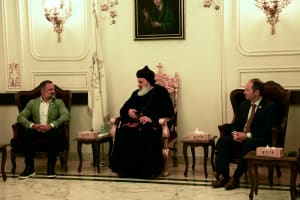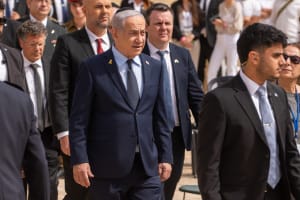Who was Hassan Nasrallah, the secretary-general of Hezbollah?
Over three decades, Nasrallah changed Hezbollah from a local Iranian-backed militia, to Iran’s strongest proxy and one of the largest paramilitary organizations in the world

Over the past three decades, Hassan Nasrallah has become almost synonymous with the terror group Hezbollah. Indeed, he was even called the “personification of Hezbollah” due to his shaping of the group’s direction and character over the past 32 years.
The leader who oversaw the group’s transformation from a small terror group to a vast “state within a state” inside Lebanon, with a global reach, was only 64 when he was killed in an Israeli air strike on Friday, Sept. 27, 2024.
Hassan Nasrallah was born on Aug. 31, 1960, the ninth of ten children born to a humble shop owner in east Beirut. During his schooling, Nasrallah excelled in theological studies.
During the Lebanese Civil War, he went to Iraq, where he studied at Ayatollah al-Sadr’s seminary.
Nasrallah came to hold the highest position in Hezbollah at age 32, after Israel eliminated his predecessor, Sheik Abbas al-Musawi, in a helicopter gunship attack on the convoy he was traveling in.
Nasrallah was well known for his traditional black robes and black turban, the latter symbolizing his role as a Shiite cleric and a sayyid—individuals believed to trace their ancestry back to Muhammad, the prophet of Islam.
The Hezbollah leader was one of the founding members of the terror group in the early 1980s, after leaving the Shia party, Amal. Part of the reason he left Amal is allegedly due to its unsympathetic stance toward Palestinians living in Lebanon.
Following the teachings of Iranian Supreme Leader Ayatollah Khomeini, Nasrallah and the other founders of Hezbollah understood the powerful imagery of claiming to represent the downtrodden and oppressed. In its founding document, Hezbollah claimed to speak for “the downtrodden of Lebanon,” including the Palestinians.
Hassan Nasrallah rose rapidly within the ranks of Hezbollah, quickly becoming commander of the Bekaa Valley District. In 1987, at only 27 years old, Nasrallah was appointed president of the Executive Council, the main political body of the terror group, and a member of the Shura (Consultive Council).
In 1992, just days after his predecessor was killed, Nasrallah was elected secretary general, which led him to become the longest-serving leader of the group since its inception.
Despite his scholarly training, having studied in Shia learning centers in Iraq and Iran, Nasrallah interjected local Lebanese Arabic terms into his polished Arabic. He projected the image of a humble person, confident only in his convictions.
However, there is little doubt that his support for developing Hezbollah’s global media branches significantly increased his mass appeal.
Over three decades, Nasrallah changed Hezbollah from a local Iranian-backed militia, to Iran’s strongest proxy and one of the largest paramilitary organizations in the world, with a strong fighting force.
Nasrallah positioned Hezbollah as a central force in Lebanese political life, effectively leveraging Iranian funding to establish a Shiite state within a state in Lebanon. In this framework, Hezbollah loyalists could access regular municipal and community services, even as the Lebanese government struggled to maintain electricity, fund hospitals, and pay government workers.
At the same time, beyond the “guns and butter” approach of pouring money into the Shiite sector of Lebanon to garner support for the organization, Nasrallah also oversaw Hezbollah’s branching out into diamond smuggling in Africa and drug smuggling in South America. Political and trade connections in South America, along with a significant Arab diaspora in Latin America, helped Hezbollah develop connections for its own purposes, as well as for the Iranian regime.
But beyond growing Hezbollah into a regional power, Nasrallah is well known for another accomplishment –continually keeping the focus of Middle Eastern Arabs on the State of Israel.
Partially due to his success in pushing Israel out of Lebanon through a war of attrition in 2000, and Hezbollah’s success in fighting the IDF to a stalemate during the Second Lebanon War, Nasrallah came to be seen by many in the Arab Muslim world as someone who knew how to deal with Israel.
In reality, the Second Lebanon War was devastating for the country, but at the time, most Israelis did not have the stomach for a longer war.
His speeches, carried via satellite across the Middle East, became must-watch events for those who looked on Israel as the source of the Middle East region's problems. Nasrallah once said of Israel, “It has a nuclear weapon and the strongest Air Force in the region, but in truth, it is weaker than a spider’s web.”
Nasrallah oversaw several significant terror attacks on Jewish and Israeli targets around the world, as well as attacks on U.S. interests.
In 1994, Hezbollah carried out a suicide bomb attack on the Buenos Aires AMIA Jewish community headquarters, killing 85 and injuring over 300.
Two years later, in 1996, another Hezbollah suicide bombing operation destroyed part of the Khobar Towers in Saudi Arabia, killing 19 U.S. servicemen stationed there as part of continued operations following the First Gulf War.
In 2000, Hezbollah abducted three IDF soldiers in a cross-border raid.
Five years later, in 2005, Hezbollah was widely believed to be behind the assassination of Lebanese Prime Minister Rafik Hariri. The group managed to prevent an internal Lebanese investigation into the bombing by threatening Lebanese politicians.
In 2006, during another cross-border raid, Hezbollah killed eight IDF soldiers and abducted two, leading to the Second Lebanon War, which lasted for 32 days. Hezbollah ended the war by agreeing to accept the terms of UN Security Council Resolution 1701, which it never actually implemented.
Since 2006, the group has regularly launched short-range rockets at Israel’s northern communities.
While Hassan Nasrallah regularly blasted the “Zionist enemy” and the United States in his speeches, calling all Muslims, not just the Shiite residents of Lebanon, to fight against them both. He also argued against disarming Hezbollah, claiming that doing so “would leave Lebanon exposed before Israel.”
However, as he began to target Israel more frequently in his fiery speeches to Hezbollah supporters in Lebanon and around the world, Nasrallah also betrayed his fear of the vastly superior resources of the IDF and the Mossad.
At the end of the Second Lebanon War, Nasrallah began to live almost exclusively in secret underground bunkers and tunnels, making only occasional unannounced appearances at public events for loyal Hezbollah members.
In 2011, Nasrallah threw his support behind Syrian President Bashar al-Assad during the Syrian Civil War. While this cost him some support, primarily from Sunni Muslims, it led to Hezbollah becoming one of the few battle-hardened terror organizations. This appeared to give Hezbollah a further edge in a future conflict with Israel.
More recently, Nasrallah instructed top Hezbollah leadership to stop using cell phones and other internet-connected devices that could easily be tracked or compromised by Israel’s security sector.
On Oct. 8, 2023, under the orders of Hassan Nasrallah, Hezbollah began launching rockets at northern Israel, despite being apparently caught off guard by the Hamas terror group's surprise invasion of southern Israel the day before.
Since then, Hezbollah has pledged its support for the Palestinian “resistance” by repeatedly denying any attempts to negotiate a separate ceasefire with Israel and saying it would only agree to a ceasefire when Israel successfully negotiated one with Hamas.
Nasrallah has claimed several times that Hezbollah’s involvement in the Gaza War kept Israel distracted and unable to commit its full forces to the war in the Gaza Strip.
However, Nasrallah’s strategy appears to have backfired. Despite his reputation for accurately gauging the IDF’s actions and responses, he seems to have grossly miscalculated Israel’s willingness to escalate the situation in the north and failed to understand the extent of Israel’s infiltration into the Hezbollah network.
Just 11 days after the audacious pager attack that killed dozens of Hezbollah senior military operatives and wounded thousands more, Israeli leadership appeared to have played a bluff on Nasrallah, luring him into thinking that Netanyahu was actively seeking a ceasefire agreement to pursue the path of diplomatic de-escalation.
Instead, while the Hezbollah leader gathered with several other high-ranking Hezbollah and IRGC leaders, the Israel Air Force eliminated the man that Netanyahu called “the arch-murderer.”
On Saturday, Netanyahu said Nasrallah’s elimination was “a necessary condition” in achieving Israel’s objectives, including the return of the residents to the northern communities.
“Nasrallah was not just another terrorist, he was the terrorist,” said Netanyahu. “He was the axis of the axes, the main engine of Iran’s axis of evil. He and his people were the architects of the plan to destroy Israel.”
The killing of Nasrallah will undoubtedly have a significant impact on the entire Middle East, though the exact nature of this effect remains unclear. But for now, many Israelis are sleeping a little more soundly.

J. Micah Hancock is a current Master’s student at the Hebrew University, pursuing a degree in Jewish History. Previously, he studied Biblical studies and journalism in his B.A. in the United States. He joined All Israel News as a reporter in 2022, and currently lives near Jerusalem with his wife and children.














